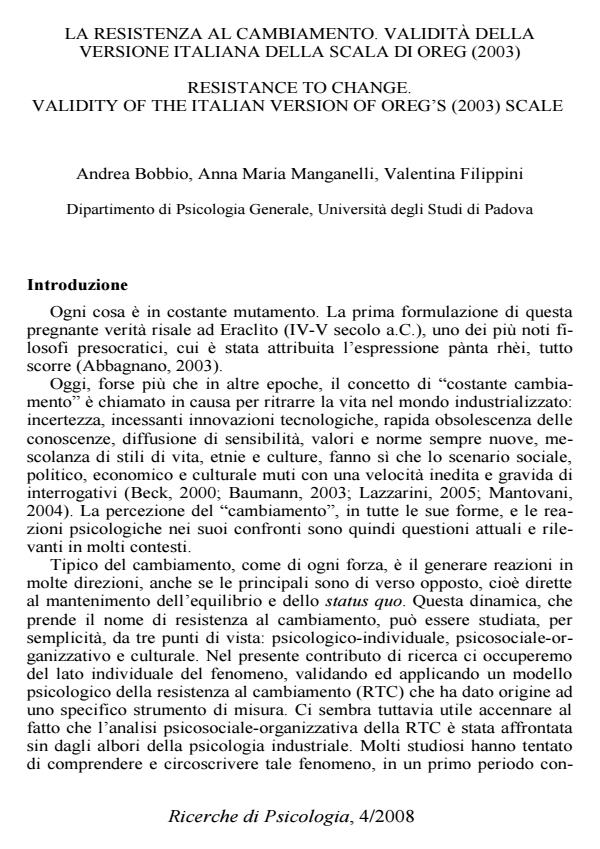La resistenza al cambiamento. Validità della versione italiana della scala di oreg (2003)
Journal title RICERCHE DI PSICOLOGIA
Author/s Andrea Bobbio, Anna Maria Manganelli, Valentina Filippini
Publishing Year 2009 Issue 2008/4
Language Italian Pages 24 P. 7-30 File size 721 KB
DOI 10.3280/RIP2008-004001
DOI is like a bar code for intellectual property: to have more infomation
click here
Below, you can see the article first page
If you want to buy this article in PDF format, you can do it, following the instructions to buy download credits

FrancoAngeli is member of Publishers International Linking Association, Inc (PILA), a not-for-profit association which run the CrossRef service enabling links to and from online scholarly content.
La resistenza al cambiamento. Validità della versione italiana della scala di oreg (2003) - The aim of the study is to propose the Italian version of the multifactor resistance to change scale (RTC) developed by Oreg (2003), and to examine its psychometric properties. The research was conducted via self-administered questionnaires on a group of 324 adults, men and women, currently employed. Correlations were computed between RTC and measures of personality factors (Big Five), sensation seeking, need for cognitive closure, emotional control, cognitive abilities, and political orientation. Then, the correlation between RTC and social desirability was computed. Moreover, differences in RTC scores between sub-groups with a different amount of change experiences were analysed. Finally, via multiple regression analysis, the best predictors of RTC were identified. RTC factorial structure, made up of four first-order factors and a single second-order factor, was supported by confirmatory factor analysis results. The internal consistency was also acceptable. RTC measure was negatively correlated with extraversion, agreeableness, emotional stability and openness (Big Five), sensation seeking, and emotional control. The correlation between RTC and need for cognitive closure was high and positive. The correlation between RTC and social desirability was week and negative, and no correlations at all resulted between RTC, cognitive ability and political orientation. Participants with a high number of change experiences had a lower RTC scores when compared with those with a low number of change experiences. Finally, need for cognitive closure was the most important predictor of resistance to change score.
- Bureaucratic Red Tape and Technostress: Hierarchical Control in Technology Adoption and Employee Well-Being, and the Dual Moderating Role of Resistance to Change as a Demand or an Overlooked Resource Diego Bellini, Barbara Barbieri, Marina Mondo, Federica Batzella, Jessica Pileri, Max Rapp-Ricciardi, Silvia De Simone, in International Journal of Public Administration /2026 pp.1
DOI: 10.1080/01900692.2025.2596643 - Flexibility Competence Assessment: A Systematic Literature Review Sibilla Montanari, in Education Sciences /2025 pp.1118
DOI: 10.3390/educsci15091118 - Job insecurity, subjective well-being and the moderating role of locomotion Andrea Bobbio, Anna Maria Manganelli, Silvano Cannone, in Giornale Italiano di Medicina del Lavoro ed Ergonomia /2025 pp.42
DOI: 10.4081/gimle.603
Andrea Bobbio, Anna Maria Manganelli, Valentina Filippini, La resistenza al cambiamento. Validità della versione italiana della scala di oreg (2003) in "RICERCHE DI PSICOLOGIA " 4/2008, pp 7-30, DOI: 10.3280/RIP2008-004001